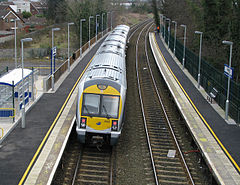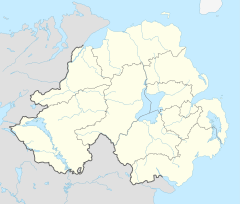Finaghy Primary School
Finaghy
|
|
|---|---|
 Finaghy railway station |
|
| Finaghy shown within Northern Ireland | |
| Irish grid reference | O003360 |
| District | |
| County | |
| Country | Northern Ireland |
| Sovereign state | United Kingdom |
| Postcode district | BT |
| Dialling code | 028 |
| EU Parliament | Northern Ireland |
| NI Assembly | |
Finaghy (from Irish: an Fionnachadh, meaning "the white field") is an electoral ward in the Balmoral district of Belfast City Council, Northern Ireland. It is based on the townland of Ballyfinaghy (from Irish: Baile an Fhionnachaidh). There has been a small community in the area since the 17th century, and it has been involved in the production of linen, which was key to the Lagan Valley area at the time.
In the 1930s, the community gradually started to grow; the local Presbyterian church was founded in 1936. In the 1950s, the city of Belfast grew outwards. Housing estates were built in Finaghy, including Benmore, Locksley and Erinvale, which caused the population to at least double. Finaghy now refers to the area along the Lisburn Road from the King's Hall to the start of Black's Road and between the Malone Road and the M1 Motorway bridge at Finaghy Road North. The heart of the area is Finaghy crossroads, where the Lisburn Road intersects with Finaghy Road North and Finaghy Road South.
Finaghy is home to the first purpose-built National Health Service clinic in the United Kingdom. Unusually, Finaghy has no pubs or betting shops: it was stipulated in land deeds that there were to be no public houses on the land belonging to Ballyfinaghy House, the past residence of Ralph Charley, a wealthy Belfast merchant who made a fortune from the linen industry. Behind the crossroads is the new Finaghy Campus, which houses a freshly built public library, the non-denominational Finaghy Primary School and community playing fields.
...
Wikipedia

